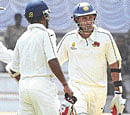Slow Agarkar in a spot of bother

The former Indian all-rounder faced match referee S Ramesh’s censure after being reported by on-field umpires Amiesh Saheba and Sanjay Hazare after being dismissed in the first over after lunch.
R Vinay Kumar went for a sharp return catch on his follow-through but merely succeeded in the parrying the ball to mid-off, from where Sunil Joshi relayed the ball to the wicket-keeper. Noticing that Agarkar, who had returned to his crease but had strayed out while ‘shadowing’ the stroke, was out of his ground, CM Gautam under-armed the ball at the stumps and scored a direct hit.
Prompt appeal
Gautam and Stuart Binny at point were the only Karnataka fielders aware that Agarkar had left the safety of his crease, and promptly appealed to square-leg umpire Hazare, who in turn referred the appeal to third umpire S Ravi.
Television replays conclusively proved that Agarkar was out, but that was not the bone of contention.
Immediately after the appeal was made and Hazare drew the rectangle to bring Ravi into play, Agarkar threw his arms wide, wondering what the fuss was all about. His prolonged protest after the third umpire had delivered his verdict, however, was not in the fitness of things and that is what attracted the match referee’s attention.
Agarkar’s argument was that the ball was dead since it had nestled in the ‘keeper’s gloves and he was not attempting a run. While he is entitled to his opinion, the law clearly states that it is what the umpire thinks that is decisive.
What the law says
Law 23, dealing with ‘Dead ball’ states that the ball comes into play when the bowler starts his run-up or his bowling action, and becomes dead when, among other things, ‘it is finally settled in the hands of the wicket-keeper or the bowler’. It adds, “The ball shall be considered to be dead when it is clear to the umpire at the bowler's end that the fielding side and both batsmen at the wicket have ceased to regard it as in play.”
The clincher, however, is the clause that reads, “Whether the ball is finally settled or not is a matter for the umpire alone to decide.”
That leaves no scope for ambiguity, because it was for Hazare alone to decide if the ball was in play or not. Agarkar’s behaviour did a player of his stature no credit whatsoever and if, as is learnt, he has got away with only a warning, he can consider himself extremely lucky. Especially considering the whole episode was aired live, on national television.
DH News Service